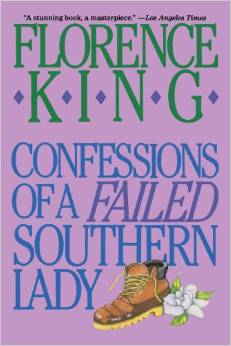Confessions of a Failed Southern Lady
Florence King
St. Martin’s
Originally published in 1985, Confessions of a Failed Southern Lady combines some of my favorite genres: memoir and the American South. I am a born and raised Texan (which straddles the line between the South and the West). Southern fiction writers such as Flannery O’Conner, Alice Walker, Dorothy Allison, Fannie Flagg, Rebecca Wells, etc. sit on a special section of my bookshelf reserved for Southern lit along with memoirists Jenny Lawson’s Let’s Pretend This Never Happened and Anna Mitchael’s Just Don’t Call Me Ma’am.
Set during the 1950s and 1960s, Confessions of a Failed Southern Lady follows the teenage and college years of King, a white, working class, queer woman from D.C. She lives with her mother (also a failed Southern lady), her eccentric Southern grandmother who supports segregation yet is best friends with Jensy, an eccentric Southern black woman that also lives with the King family, and finally King’s erudite and bookish, British father Herb.
Erudite and furiously independent like her father, King struggles with the contradictory messages of what a “true” Southern lady is, as well as her the dawning realization of her own queerness. If you are from the South or know people from the South, you will recognize the archetypes in King’s memoir. But, King holds these archetypes over a flame, somewhere between reverence and destruction. It’s hilarious and frank and simultaneously oblique.
–Ginnis
Blasphemy
Sherman Alexie
Grove Press
I like to read seasonally – meaning I like to read books that fit the season. One of my favorite bloggers first got me into this idea with her Break Your Heart Reading Winter List. Winter is for reading the kind of books that require a fireplace, blanket, and a your favorite drink for keeping you warm. Usually afterwards, you have to burrow under your covers and stare into the fire as your heart recovers from being ripped out and put back in again. This is one of the reasons I brought Sherman Alexie’s 2012 collection of short stories, Blasphemy, to read while I was on vacation in Montana. Having read Reservation Blues in college, I wanted to revisit Alexie. Alexie and Louise Erdrich are the Native American writers on the contemporary American fiction reading lists of many college classrooms. Throw in Toni Morrison and Alice Walker for some more diversity. Anymore than that and you got yourself a Native American Literature class or an African-American Literature class.
Blasphemy makes you laugh and ache in so many different ways. You laugh until you ache or ache until you laugh. I’m not really sure which way it goes, but after you are done, you wonder how the hell you will recover after reading a book like that. I thought, still am thinking, about my whiteness, about Indian-ness, about identity, about colonialism’s past and present and its role in identity. That’s the kind of winter reading I am talking about.
–Ginnis


